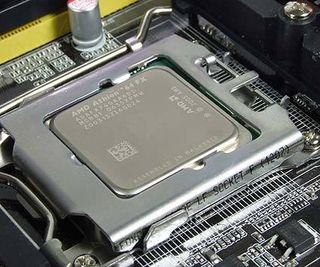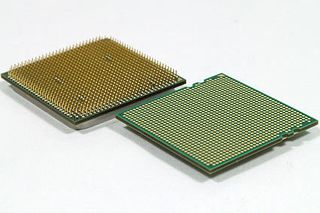The Server Primer, Part 1
Processors

AMD Opteron (Socket 940), Intel Xeon "Dempsey" and Xeon "Woodcrest" (Socket 771): these are three popular server dual core processors.
You are certainly familiar with the Athlon, Celeron, Core 2 and Sempron, all of which are desktop processors for home PC and office machines. Both AMD and Intel also have products that cater to professional customers: the AMD Opteron and the Intel Xeon and Itanium. Opteron shares its AMD64 architecture with the Athlon 64 and Sempron processors, while the Xeon is largely similar to the Core 2 and the Pentium family, depending on the model.
Professional processors offer better system connectivity - multiple HyperTransport links for Opterons, dual independent buses in the Intel world - and a richer feature set, which is often required in server and workstation applications. Eventually, all features end up relating to the "RAS" factors in one form or another.
AMD Opteron

There are two different Opteron processor versions on the market: one based on Socket 940 with DDR memory support, the other for Socket 1207 (Socket F) and DDR2 RAM. As with all AMD64 processors, the memory controller is an integral part of the processor, which is a significant advantage with increasing processor count: not only do you get more memory controllers to install more RAM, but each processor can access its own memory block. This results in coherency issues that add complexity to multi-processor systems, but also result in a bandwidth advantage for multi-processor solutions. The Socket 940 Opterons use a pin grid array (PGA) package, which means that the processor pins are inserted into the socket. Socket 1207 Opterons use a land grid array (LGA), placing flat contacts onto tiny coils inside the socket.
These days, you should always go for dual core processors. Even a dual core processor with a low clock speed is superior to a single core model in the server space. The Socket 940 Opterons with dual cores are based on the Egypt and Italy cores, with the latter the more advanced core. However, we recommend going for Socket 1207 (Socket F), due to its DDR2 memory support and upgrade path to quad core processors, which will arrive sometime this year.

This is AMD’s current Socket F, with 1207 connectors for current dual core and future quad core Opterons.
Stay on the Cutting Edge
Join the experts who read Tom's Hardware for the inside track on enthusiast PC tech news — and have for over 25 years. We'll send breaking news and in-depth reviews of CPUs, GPUs, AI, maker hardware and more straight to your inbox.
Most Popular

